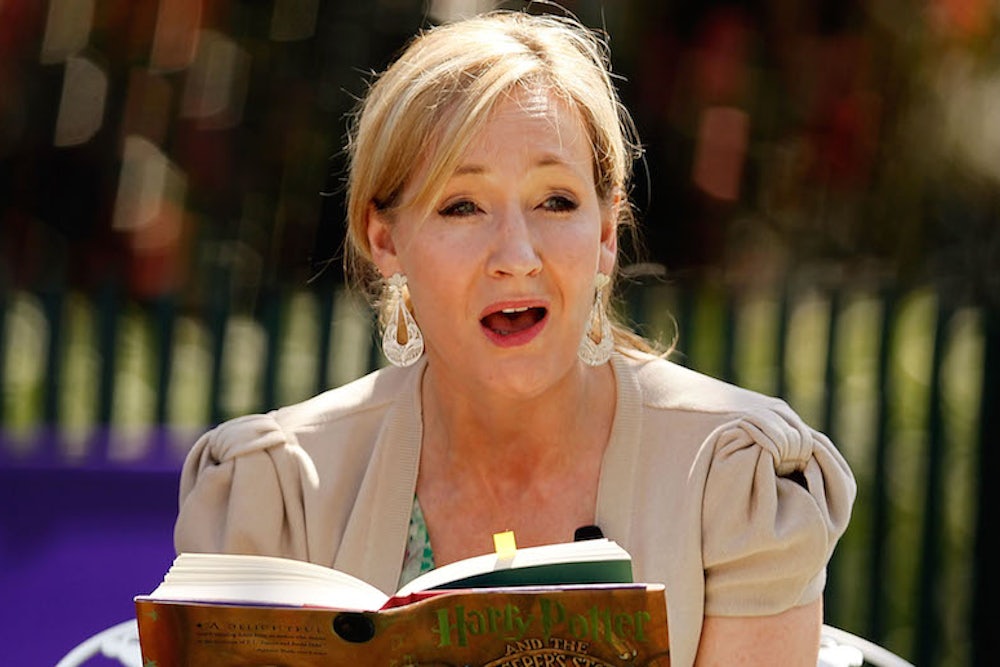“There are celebrities—and then there are celebrities.” That’s the first line of J.K. Rowling’s latest Harry Potter short story, published this morning on her own website, Pottermore. Rowling, who has always had a strained relationship with her own fame, might as well be talking about herself. (She published her second pseudonymous detective novel last month, to solid reviews.) There are celebrity writers, and then there are celebrity writers—the kind who can post a 1500-word piece of writing on their personal website and immediately make international headlines.
If, like me, you woke up this morning excited by the headlines and tweets declaring that Rowling has written a new Harry Potter story, you may be disappointed. Almost seven years after publishing the final Harry Potter book, Rowling has returned to the wizarding world for the first time, but the results are flimsy. What’s being billed as Rowling’s first post-Deathly Hallows short story set in the “Harry Potter” universe is just a brief fictional dispatch from Rita Skeeter, the wizarding world’s nastiest gossip columnist. If you aren’t already a member of Pottermore, Rowling’s official fansite, you’ll have to sign up for an account. When I finally read the story, after surrendering my name, email address, and birth date, I felt a little conned. This wasn’t a short story—this was a digital marketing campaign.

Rita Skeeter is writing from the Quidditch World Cup championship fifteen years after the events of the final book, providing a “Where Are They Now” game that’s sort of fun. Harry is nearly 34, his hair is beginning to gray. Poor Ron is already losing his hair. (As someone who was the same age as Harry when the first books were published, this premature aging is tough to read about.) Hermione is balancing motherhood with a demanding career. (“Does Hermione Granger prove that a witch really can have it all?” Skeeter asks.) We get updates on Ginny Weasley, Neville Longbottom, Luna Lovegood, and even Viktor Krum. Like the reunion special of a TV soap, the next generation—Bill Weasley’s daughter and Remus Lupin’s son, now teenagers—are romantically involved.
All this information comes from an unreliable source, of course. Rita Skeeter, with her poison pen and claw-like nails, was one of the minor villains of the Harry Potter series, spreading catty, made-up gossip about our heroes and showing no moral qualms. She’s also an avatar for Rowling’s aggrieved relationship with the media. “It really was like being under siege or like a hostage,” Rowling told the Leveson Inquiry when testifying a few years ago about the British press. In that light, the new story reads like a barely veiled attack on the entitlement and moral bankruptcy of British tabloid culture. “One always hesitates to invade the privacy of young people,” Rowling, in the voice of Skeeter, writes. “But the fact is that anyone closely connected with Harry Potter reaps the benefits and must pay the penalty of public interest.”
Unlike the series’ ill-advised epilogue, the new story doesn’t wrap everything up in a bow. We’re left wondering where the cut on Harry’s face came from and how much of the column is vicious rumor. But like that epilogue, it’s a symptom of Rowling’s reluctance to cede control of her creations. Since ending the series, she’s revealed that Dumbledore was gay, that Harry and his cousin Dudley reconciled, and that Harry and Voldemort were related by blood. You don’t have to be a Barthesian grad student to chafe at Rowling’s impulse to clarify the words on the page. When writers adopt the paratextual world of fanfic as their own, they both diminish their books’ literary authority and interfere with the freewheeling spirit of fan writing.
So if you’re really jonesing for a Harry Potter fix, you’re probably better off re-reading the originals or turning to some of the fantasy writers who influenced or were influenced by Rowling—Diana Wynne Jones, Susan Cooper, Suzanne Collins. And don’t forget: harrypotterfanfiction.com has 82,406 stories, and counting.
